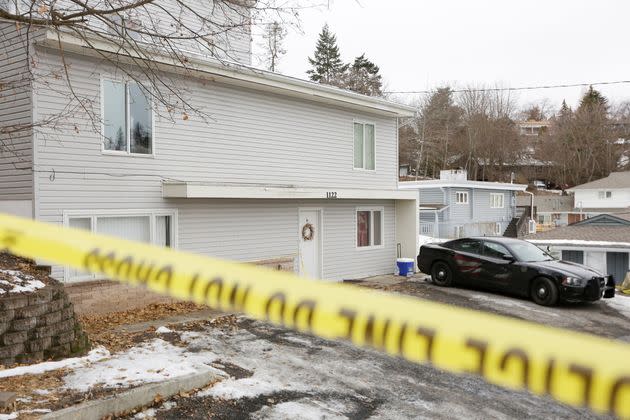Plan To Demolish House Where Idaho Students Were Killed Is Paused After Families' Outrage
The house where four college students were brutally stabbed to death last November will remain standing until October, the University of Idaho announced Wednesday, following outrage from some of the victims’ family members over its planned demolition.
In an email to students and employees, President Scott Green said that the university had reversed course on its decision to demolish the rental house on King Road in Moscow, Idaho, where Madison “Maddie” Mogen, 21; Kaylee Goncalves, 21; Xana Kernodle, 20; and Ethan Chapin, 20, were killed on Nov. 13. Bryan Kohberger, a former criminology student at Washington State University, in nearby Pullman, has been charged with four counts of murder and is facing the death penalty if convicted.
“We will revisit this decision in October,” said Green, who noted that the university still “fully” expected to demolish it.

The Moscow, Idaho, residence where students Ethan Chapin, Madison Mogen, Xana Kernodle and Kaylee Goncalves were found dead on Nov. 13 is roped off amid investigations in January.
“Thank you to the University of Idaho for honoring the wishes of the families by not demoing the King Rd. house,” the Goncalves family said in a statement provided to HuffPost by their attorney, Shanon Gray.
The owner of the house donated it to the university earlier this year. The university had initially planned to tear it down this spring, long before the murder trial was set to begin, with the permission of both the prosecution and defense teams, which Green noted in his email. That did not sit well with some of the victims’ family members, specifically the Goncalveses, who were vocal in their objections.
“The university asked for the families’ opinions on the demolition and then proceeded to ignore those opinions and pursue their own self-interests,” Gray said in an early July email to The Idaho Statesman.
Gray told the Statesman that members of the Mogen and Kernodle families also opposed the demolition of the property until after the trial, which is scheduled to start Oct. 2. The trial could be delayed, however, after a judge on Monday granted the defense’s request to stay the proceedings.
“The home itself has enormous evidentiary value as well as being the largest, and one of the most important, pieces of evidence in the case,” Gray told the Statesman.
Prosecutors have disputed that the house would play a role in the trial; unlike other high-profile cases, they did not plan for the jury to tour the scene of the killings.
“The scene has been substantially altered from its condition at the time of the homicides including removal of relevant property and furnishings, removal of some structural items such as wallboard and flooring, and subjected to extensive chemical application creating a potential health hazard,” Latah County Prosecutor Bill Thompson said in an email to the university that was viewed by CNN. “These are some of the reasons that we have concluded that a ‘jury view’ would not be appropriate.”
In his original Feb. 24 announcement, Green had called the proposed demotion a “healing step” that would counter “efforts to further sensationalize the crime scene.”
He echoed that sentiment Wednesday, saying, “It is a constant reminder of the heinous acts that went on inside it. It is also a place that continues to draw unwanted attention from media, YouTubers and others.”
Still, Green acknowledged Wednesday that the house “elicits deep emotional responses from those who are working through grief and who fear that its destruction could impact the court case.”
“We hear all these arguments, take them seriously and weigh them against the greater good for our university. … This is why the decision about what to do with the King Road house is so difficult,” he said.
Following the removal of hazardous asbestos and lead, Green said, “personal items from the residents will be removed and families will soon be able to retrieve their loved ones’ possessions to the extent they wish to do so. We will continue to work discretely and respectfully with the families on this.”
